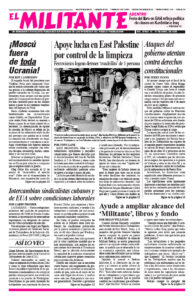CHICAGO — “A decadeslong retreat by the working class and unions has ended, while the owners of capital and their parties, Democrats and Republicans alike, are intensifying efforts to shift the burden of their crisis onto working people,” Roy Landersen, a leader of the Socialist Workers Party, said in a talk here March 30. And, following Moscow’s brutal invasion of Ukraine, “the imperialist ‘world order’ is unraveling, with global conflicts among rival powers mounting,” he said.
Landersen was presenting the new book, The Low Point of Labor Resistance Is Behind Us: The Socialist Workers Party Looks Forward by SWP leaders Jack Barnes, Mary-Alice Waters, and Steve Clark at a session of the Platypus Affiliated Society’s 15th International Convention. It was held that weekend at the University of Chicago.
Platypus is a campus-based network “for the self-criticism, self-education, and, ultimately, the practical reconstitution of a Marxian Left.” The gathering drew over 150 participants from across North America, as well as from Europe and the Pacific.
Landersen said those seeking to end the evils of capitalist society need “to join the working-class movement as it is today, not in an ideal future,” to build a party that is proletarian in its program, composition and activity. “The conflict is not ‘left vs. right’ but class vs. class.” Today, he said, that party is the SWP.
Marxists don’t preach for socialism, Landersen said, but join the class struggle at every stage. As Fredrick Engels, who along with Karl Marx was a founder of the modern workers movement, said in 1847, “Communism is not a doctrine but a movement; it proceeds not from principles but from facts.”
Debate on Cuban Revolution
Landersen pointed to the example of Cuba’s socialist revolution, where, with Marxist leadership from Fidel Castro and others, “workers and farmers in Cuba not only transformed their lives, conditions and political consciousness, but opened a renewal of communist leadership in the Americas and beyond.”
During a lively discussion period, one person said talk of the Cuban Revolution “brings up the image of guerrilla struggle in the mountains,” which he didn’t see as relevant to the situation in the United States.
Gabby Prosser, an industrial bakery worker and member of the SWP and the Bakery, Confectionery, Tobacco Workers and Grain Millers union in Minneapolis, explained how she had just returned from a visit to Cuba, where she met representatives of the food workers union there.
She described the fights she and her co-workers have waged at her workplace for safer conditions, using the union. She also described the much stronger position Cuban unionists are in. “Workers are in power there, it’s their state. That’s what’s important about the example of the Cuban Revolution.”
One participant said union membership in the U.S. is much lower today than in the 1970s, and militant strikes even then didn’t lead to socialist revolution. “What’s different about today?” he asked.
Landersen pointed to the depth of the economic crisis of capitalism today, and experiences workers have had with the U.S. rulers’ imperialist wars and assaults on constitutional freedoms. This has caused working people to shed illusions in the bosses and their parties.
This debate continued at an April 1 panel titled, “Back to the 1970s? Socialism, Labor and the Left,” in which rail worker and Chicago SWP leader Naomi Craine participated.
Several people questioned the SWP’s call for a labor party asking how would that be different from existing reformist parties that use that name in Europe and elsewhere. One referred to the Democratic Party as historically the party of workers in the United States.
“The Democratic Party is the largest party of U.S. imperialism,” Craine said. “The program of a party is set by the class the party represents, not by the class that votes for it.”
Parties like the Labour Party in the U.K. have long shed any control by the unions, she said, ruling openly for the capitalist rulers there. The SWP calls for working people to push for building a labor party based on our unions, organized independently of the capitalist parties and fighting for all those oppressed by capital. “Within that, communists would fight for the labor party to adopt a revolutionary program,” she said.
Cam Hardy, the panel moderator, who works as a butcher in a small meatpacking plant in Toronto, told the Militant that while Platypus is focused on the left, “the Socialist Workers Party is different.” The SWP’s “involvement in the unions, especially in the Minneapolis Teamsters in the ’30s,” shows how such struggles can “go beyond victories on the job.” He said this showed how the “development of class consciousness can turn into revolutionary class consciousness.”
An SWP literature table was crowded during breaks as participants sought more discussion. Fifty-five books by SWP leaders and other revolutionary leaders were sold, including five copies of The Low Point of Labor Resistance Is Behind Us. A dozen participants signed up for Militant subscriptions.

